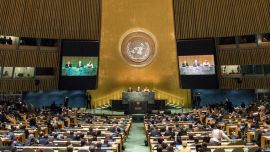During the last three decades President Alberto Fernández has undergone various incarnations, ranging from being a local candidate of the market hero Domingo Cavallo through a highly pragmatic Cabinet Chief to becoming an echo chamber for the leftist populism of his Vice-President Cristina Fernández de Kirchner with his next change of costume still a work in progress, but one political trait remains constant – a definite taste for procrastination. A fault which seems contagious because it has permeated the negotiations of his Economy Minister Martín Guzmán with the International Monetary Fund (IMF) during the last two years while the loss of credibility suffered by both men seems in turn to have been contagious for the IMF chief Kristalina Georgieva.
After the year has been largely a waiting game for the midterms, now that these have at last delivered their clear enough verdict, a further fortnight has passed by without too much happening – the government claims to have got the memo from the voters (while airbrushing any admission of defeat) but all we have had since are some more mixed messages not accompanied by any decisive action. On the one hand, implying that double severance and a ban on dismissals will not be continuing into the new year looks like moving in a moderate direction, removing a couple of the many burdens on business companies. But on the other hand, currency controls have only tightened since the midterms with the ban on quota financing for spending abroad slapped on credit cards as the week closed, spelling doom for many summer holiday plans – perhaps indispensable for giving the reserves enough oxygen to arrive at an IMF agreement but still taking the country ever further away from the normal practices of a market economy.
The current inaction is not supposed to continue indefinitely – President Fernández has announced that a macro-economic plan spanning several years will be submitted to the new Congress next month with Guzmán optimistic that he can translate it into an agreement with the IMF at a very early stage in the new year, well before US$4 billion already way beyond Argentina’s net reserves falls due in March. Yet neither a plan nor an agreement worthy of the name can be concluded in so little time and nor should this plan be automatically assumed to be what the IMF envisages. With the withdrawal of his vice-presidential sponsor from an adverse political scenario, President Fernández has more freedom of action than at any point since his record popularity in the first stages of quarantine but there is no knowing how long that window of opportunity will last and he needs to make the most of it.
As things now stand, he has probably left it too late in any case. This week’s country risk topping 1,800 points (a record since last year’s agreement with private bondholders) represents the costs of inaction although this indicator should not be overrated – as the Mauricio Macri administration demonstrated, it will take more than months or years of fiscal surplus and obedience to financial ground rules to win back the confidence of the international investment community. In any event time is lacking for either a plan or agreement contemplating all the fine print of interlinked indicators – rather than anything serious or sustainable, the two sides are more likely to reach a minimalist agreement setting targets for symptomatic areas like inflation and the fiscal deficit rather than the structural in order to sidestep a default crisis which nobody wants.
The government still has a Plan B for not being able to restructure its debt with the IMF – or rather a Plan C (for China). Ever since the visit of Hu Jintao in 2004 with talk of US$20 billion worth of Chinese investments (which never materialised), the idea of tapping into the superpower’s reserves totalling almost US$4 trillion has been around as an instant solution to most problems on a par with Vaca Muerta shale. But however elusive the material gains (and meanwhile there is a substantial trade deficit with China), the People’s Republic is always useful as a ploy for pressuring Washington as the IMF’s leading shareholder into backing a favourable agreement.
Yet the dangers of playing these two sides against each other is that such ambiguous policy with its multiple messages is beyond the time frame of global decision-makers sharing their attention with over 200 other countries and the government ends up with neither in isolation.


















Comments